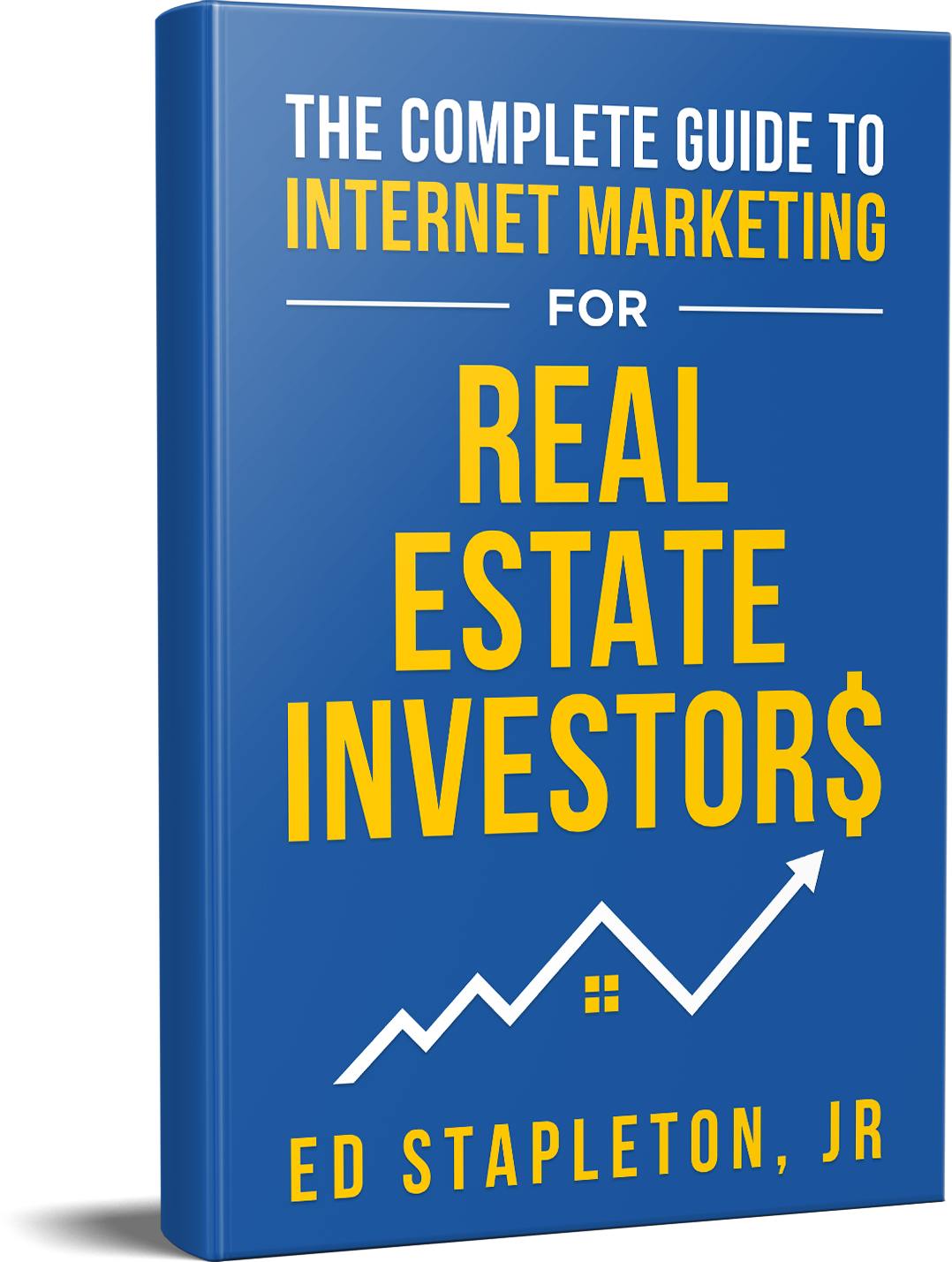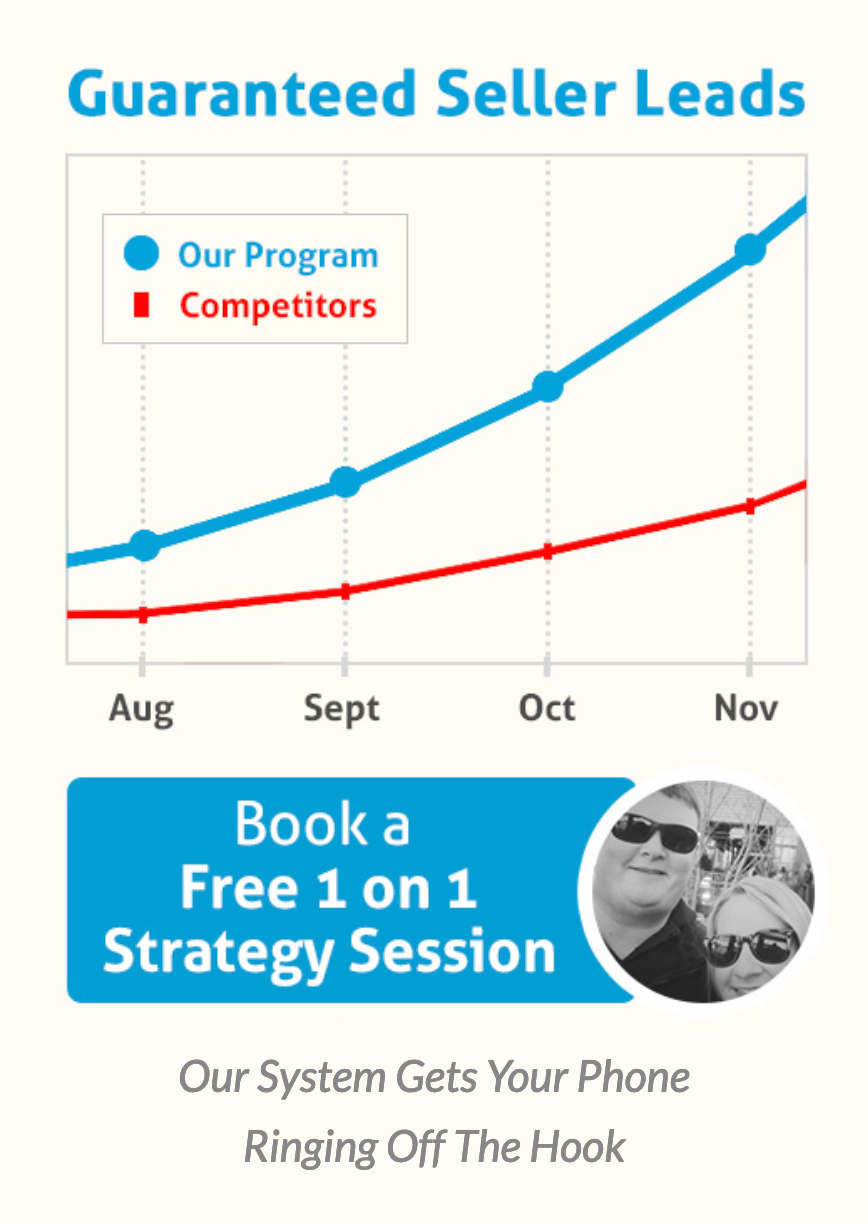Real Estate Investor SEO: How To Get Motivated Sellers Coming To You
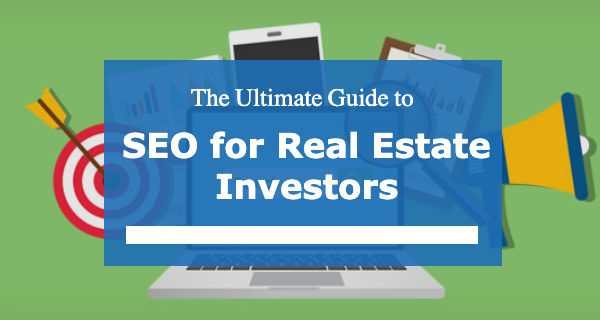
Real Estate Investor SEO
Looking to take your real estate investing firm to the next level with a proper SEO campaign? We’ve done tons of Google ads and real estate investor SEO since 2015 and know the industry like the back of our hands.
The following guide has everything you’ll need to know about SEO in order to naturally rank your investment website higher in the Google Search results.
The majority of homeowners now turn to Google when they’re looking to quickly sell their home.
Since time is of the essence, most people rarely will scroll down more than half of the Google Search results before reaching out to a company.
For this reason, it’s vitally important your website shows up at the top of the page in your local area.
The process of ranking your site naturally in search engines is what’s known as SEO.
In this article we’ll cover everything we do for our clients when it comes to ranking real estate investment websites.
What is Real Estate Investor SEO?
Real estate investor Search engine optimization (SEO) is the process of optimizing a website for search engines such as Google and Bing.
The goal of optimizing a website is to get it to naturally rank higher in search result pages so that more traffic clicks through to the site.
Since traffic from Google has such high-intent, the seller leads you get from SEO traffic is generally much higher quality than other platforms.
This is why it’s so valuable to be ranked at the top for the first page for seller queries such as, “sell my home fast”, etc.
Can SEO for Real Estate Investors Help?
- SEO will help you to keep your seller pipeline full all year round. Four out of five consumers use search engines to solve their problems so if you aren’t online you’re missing out on a huge part of the market.
- SEO will help you to improve your sales processes. By optimizing your website, and speaking with the seller leads it generates, you’ll get a clearer sense of what people are looking for in the selling process. You’ll stumble on certain desires and niches you never thought existed and this can all be seen with the detailed analytics of online marketing.
- Search engine optimization not only helps you gain visibility but also increases your brand’s trust in the local area. User’s are more likely to trust higher-ranked websites.
How Long Does SEO Take to Get Results?
- It takes Google & Bing a while to understand the content of a website and rank it among search results — this is especially true with new websites when performing real estate investor SEO. How long it takes you to rank depends on the age of your site, the quality of your website, and the competition in your market. In general, it’ll take anywhere between 6-12 months to get exceptional results. The good news is though, these results tend to last for years to come.
- Longer and slower campaigns will typically return better results. Oftentimes, business owners can get impatient with rankings but it’s important to approach real estate investor SEO with a long-term mindset. This is why we use SEO only as one part of our marketing plan. We’ve found that supplementing PPC with a real estate investment marketing strategy provides the best results since advertising provides fast results while you wait for the SEO efforts to kick in.
- Results tend to flatline around the 6-12 month mark. Once you’re ranked in the top spot there’s only so much more traffic you can get with SEO. At this point in time, it’s important to monitor and maintain efforts since competition can always creep in and steal your spots.
What Kind of ROI Can You Expect?

The ROI for SEO for real estate investors can be nothing short of incredible. Since the profits on a single deal tend to be multiple 5-figures, it’s easy to justify a couple thousand dollars a month towards search engine marketing. Further, SEO is extremely front-heavy in terms of investment so the results will persist for many months to come.
In most areas, a #1 spot on google for key search phrases can return 20-50 leads per month (passively).
We typically will look for ROI around the 4-6 month mark with our clients.
How to Measure the Success of Your SEO Efforts
What is measured gets managed.
One of the biggest mistakes investors make with SEO campaigns is they don’t track any of their efforts.
Without tracking, you won’t know what is working, and there is no way to improve results.
This is why it’s important to track certain metrics in your marketing efforts known as Key Performance Indicators (KPIs).
The KPIs you set for your real estate investment marketing strategy should align with your business goals, budget, and expected timeline of efforts.
- KPIs show us what is and isn’t working with a real estate investor SEO campaign so adjustments can be made month-to-month.
Here are some of the metrics you’ll want to track for your campaigns.
- Organic Search Rankings – Specifically, you’ll want to pay close attention to the change of rankings over time
- Organic Traffic – The total amount of users visiting your website from search engines
- New Leads – The total amount of people contacting your from your website either by phone or email
- Time on Site/Bounce Rate – Both of these user engagement metrics are important for understanding how well your website is answering the major questions of visitors
How Search Engines Work
The first step in SEO for real estate investors is understanding your existing situation. You’ll want to take a look at the above-mentioned metrics for your existing website to see where you stand in the search rankings.
A simple test – When you type in keywords such as ‘sell my home [your city here]’, does your website show up anywhere on the first page of Google search results? Repeat the same process with any other high-value keyword phrases you’d like to rank for such as ‘cash for homes’ or ‘home buyers [your city here]’.
Before getting too far ahead of ourselves, let’s first understand the differences in results on the Google search page (SERP).
You’ll generally see three different sections on a local search page.
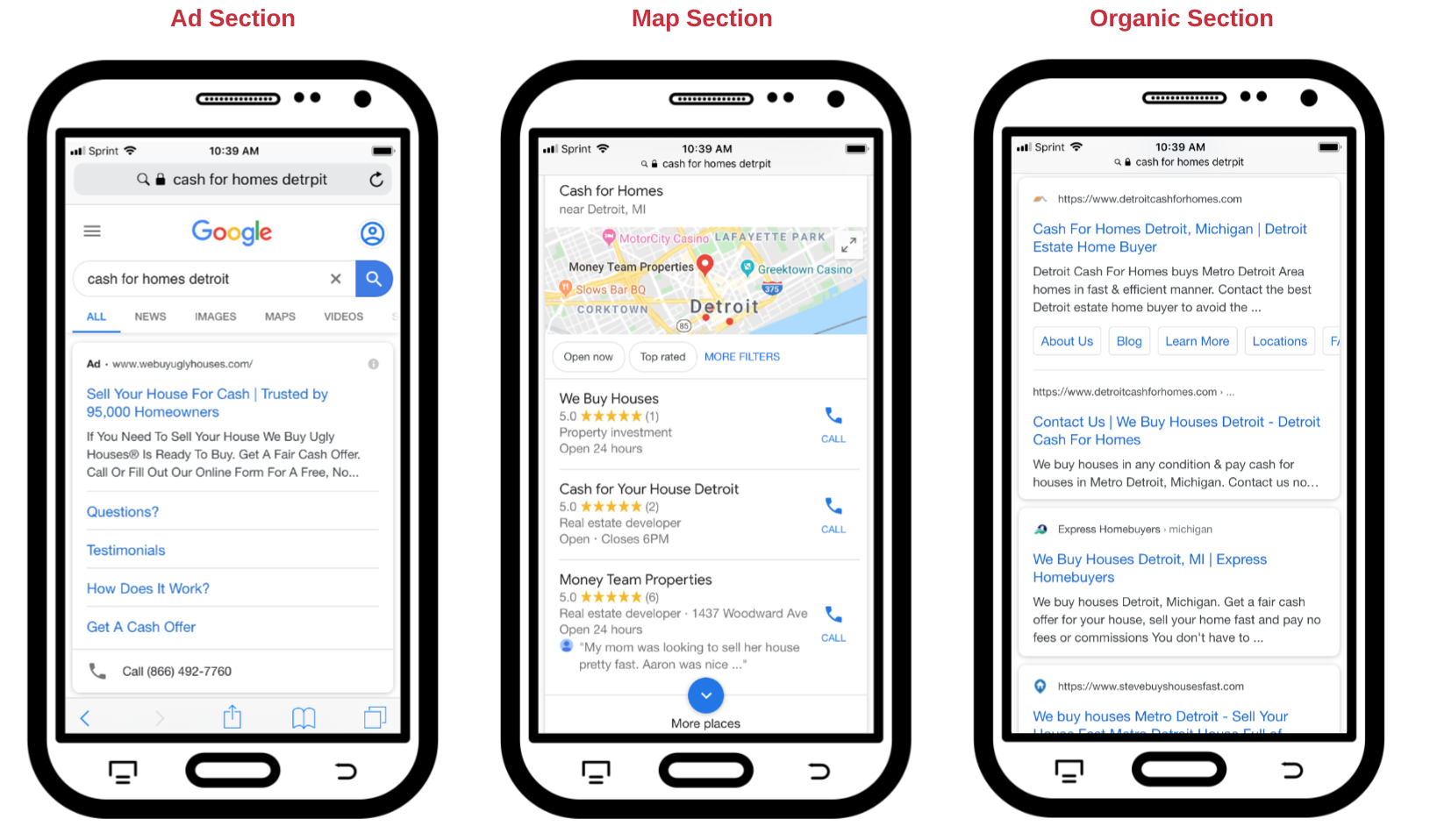
- Paid Google Ads Listings – Ads generally will show up at the top of the Google Search page as well as at the bottom and even now in the map area. Google Ads are indicated by a green “ad” text on the listing. User’s appear here based on an auction system where they bid certain amounts for clicks. Google Ads is what’s known as pay per click (PPC), meaning the advertisers pay every time someone clicks their ad.
- Google Maps Listings – The map listings display the top 3 ranking businesses but can also be expanded if the user clicks to see more in Google maps. The map rankings are based on the strength of your website and how well your google my business listing is optimized. Google map rankings also take into account reviews and location to the person searching.
- Organic Search Rankings – The listings under the map area are known as organic results. These are websites that are naturally ranking for key phrases based on the strength of their SEO.
We recommend using this tool to quickly check your rankings for any area and keyword. Type in the keyword, the location, and click ‘get URL’ to see where your website stands. It’s important to use a tool like this since Google will show your website higher in the results if you visit it often. Instead, you want to make sure you eliminate any bias and search as if you are a random person looking to sell your home for cash.
Keyword Research for Real Estate Investors
What keywords should you be ranking for?
The first thing to determine is what people are looking for in the first place. What terminology do people use when looking to sell their home?
Some of the most obvious keywords, using Detroit as an example location, are the following:
- Sell my home in Detroit
- Home buyers Detroit
- Cash for homes
- Sell my home fast
- Sell my home without a realtor
A great way to perform basic keyword research is to type some version of the above keywords into the Google search bar and see what Google suggests for alternatives.
Google suggests these variations because it knows users are often searching for them. This will give you a huge list of ideas for what to rank for and how to optimize your website around them.
The 2 Components of Search Engine Optimization
There are two aspects of SEO known as On-page and Off-page.
We’ll be covering both to give you a crash course in basic optimization.
- On-Page SEO: Refers to everything involving your website, from the content to the structure, down to the code. It is crucial to organize your website in the proper manner so that Google’s crawlers can effectively know what your business is about.
- Off-Page SEO: Refers to everything outside of your website that helps it to rank higher. Google needs to know that your business is trustworthy and authoritative before it will rank you high in the search results. Google mostly determines this by how many other high-authority sites are pointing back to yours with links. These links are essential ‘Votes’ in Google’s eyes. Another version of on-site optimization is by getting your website listed on important business listings and major directories. These types of listing are what’s known as, citations.
Both On-Page and Off-Page play an important factor and getting your website to rank so we suggest placing equal focus on each.
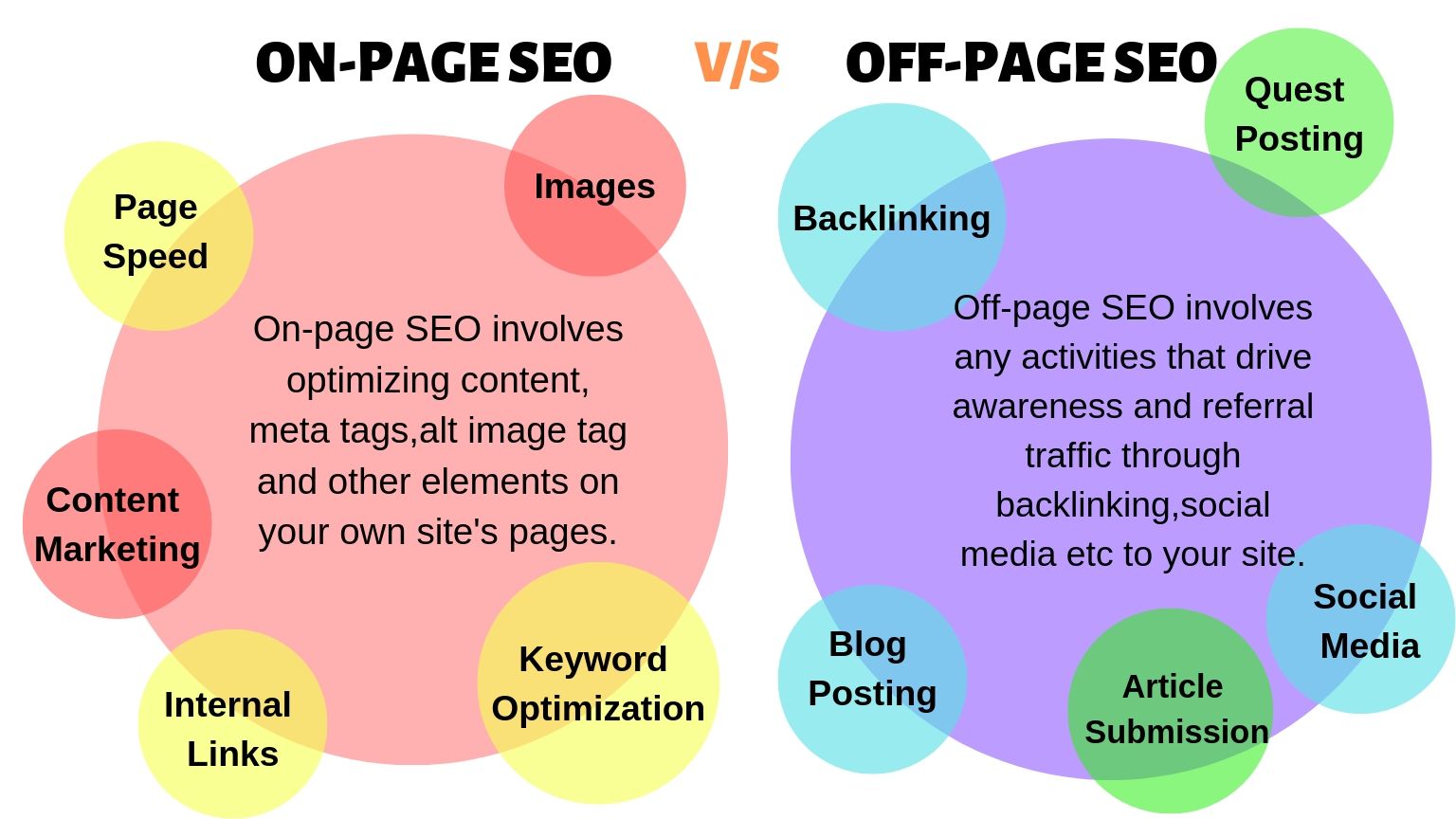
Sometimes On-Page alone is enough to rank you on the first page of Google depending on the competition in your area but more often Off-Page will be required to give you that extra push.
On-Page Optimization for Investors
On-Page, also referred to as, On-Site SEO, is the process of optimizing everything that exists on your website.
Hopefully by now, you’ve aggregated a big list of all the search terms people are looking for when selling their home.
Step 1 – Website Structure
Now, it’s time to take those keywords and use them to map out your website structure.
Each page of your website should be optimized around a particular service/keyword as well as the geographic area you’re looking to rank in.
You’ll likely have several pages, a home page, an about, contact, and a few other supplementary pages around financing, the process, FAQ, and reviews.
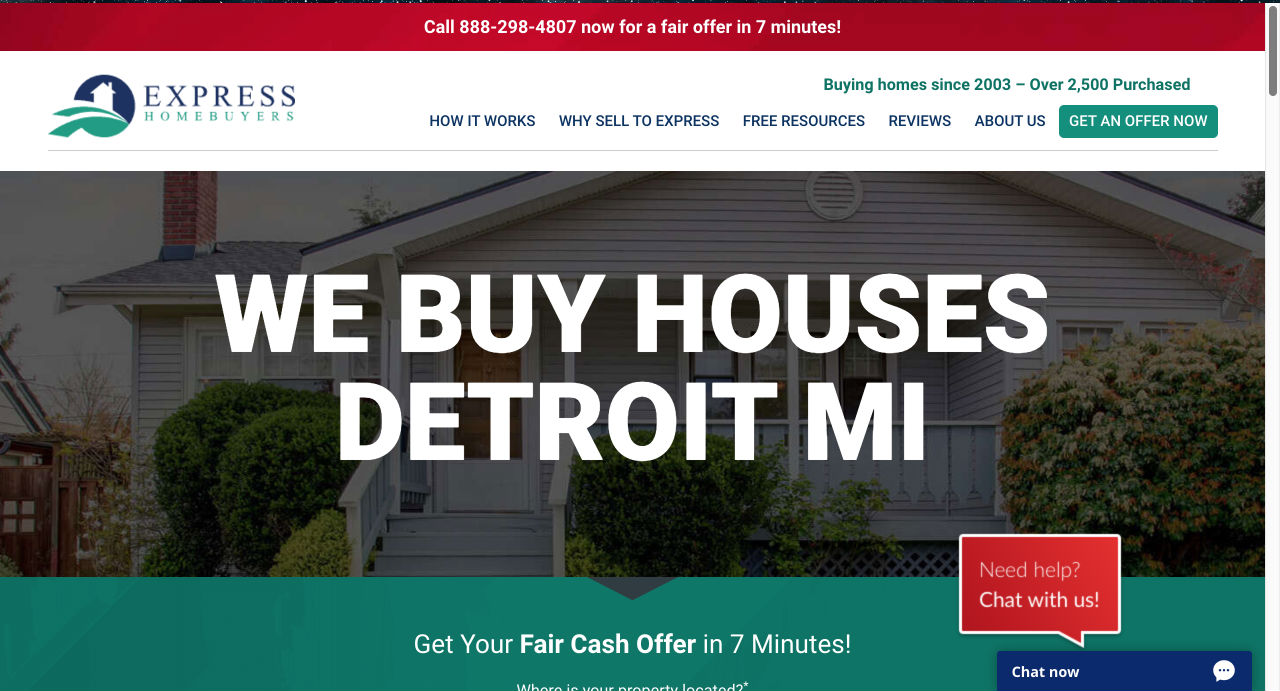
The above website is a great example of on-page SEO structure for real estate investors.
The main home page is optimized around the keyword, ‘we buy houses’ while all the other pages are supplementary.
The navigation bar at the top of the website shows the user how their process works, give free resources about selling their home (blog posts), reviews from happy customers, and a little more about the company. Notice as well, the trust signals in the top right header over the button indicating that this company is experienced!
The website also has strong calls to action (CTAs) which tell visitors what to do next.
Hover over the ‘Why Sell to Express’ and you’ll find multiple pages that are optimized around the various reasons why someone would be selling their home for cash.
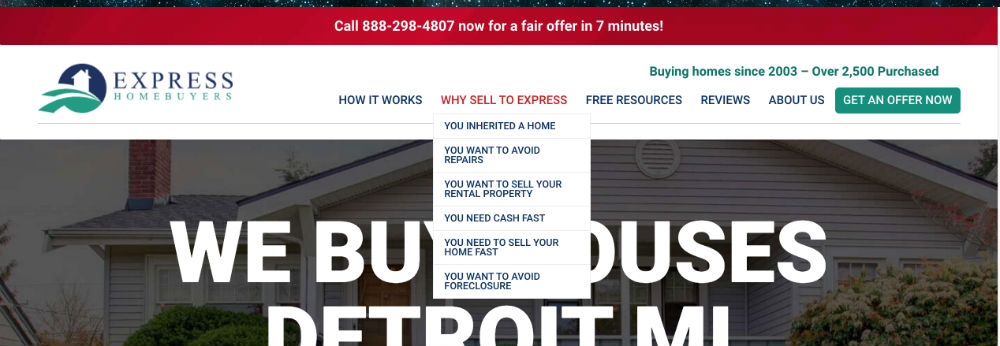
All of these are what are known as long-tail keyword phrases.
People are searching on google for phrases such as ‘sell my inherited home’ and ‘sell home to avoid foreclosure’.
By dedicating and optimizing pages of your website to these specific searches you’ll improve your overall rankings.
Map out your top navigation before even developing your site and you’ll be one step ahead of the competition.
Step 2 – Page Content
A general rule of thumb is the more valuable content you have on your site the more authority it will have in its market.
Make sure to build out dozens of pages with quality content to increase the chances of being ranked high.
The above example has pages for every reason why someone would want to sell their home. It also talks about the process of selling and answers all the users potential questions with FAQ and blog posts.
Another content area to think about is your footer which should contain all your contact information; name, phone, and address (NAP).
It should also mention the different areas you purchase homes. This will help immensely when someone in that particular area is searching in Google.
Step 3 – Optimize Your Page Content for Search Engines
For each and every page, there are several optimizations you’ll want to make to ensure your website is valued by Google.
Some of the more important On-Page items are listed below:
- A page title tag with the main keyword and location you’re targeting for that particular page. The home page should mention your brand name somewhere in the title tag as well
- A meta description that describes what your service entails and encourages the user to click to your website
- H1 tag on the page content to state clearly what the web page is all about. This tag should contain your major keyword
- URL path should contain the primary keyword that page is targeting or some variation (without looking spammy)
- Content should be broken up into H2 and H3 subheadings to make it easy for users to scan and to help target long-tail keyword phrases
- Images should have descriptive alt tags
- Other rich media such as embedded YouTube videos will help your authority
- Internal links from one page of your website to another with descriptive anchor text to help Google better understand what each page is about
Title Tags
The title tag of your pages is what users will see in the Google organic search results section so plays a major role in your rankings. The meta title is important for telling Google what your page is about as well as encouraging high click through rates (CTR) which is another ranking signal.

As mentioned before, make sure to place your main keyword, your location, and your company name in the title of the home page. Apply the same to each page of your site but you may or may not need to include the location and brand in the title of the supporting pages depending on the content.
One thing not to do is to over-optimize for your keyword. Don’t repeat the keyword too often or Google will likely penalize you for spamming.
Meta Descriptions
The meta description doesn’t directly play a large part in rankings but it can and should be used to increase CTRs of your pages. Add some variations/long-tail keywords to the description, not because Google is looking for keywords here but because the terms get bolded for users. Bolded text is just another thing to make your listing stick out from others and will likely increase your websites CTRs.
Think of the description as a short sales pitch to get people to click.
We suggest including benefits of your services, trust signals, as well as numbers and symbols in the description area to make it pop out.
H1 Tags
The H1 tag is a headline on any page of your website. It’s important to note that there should only be one of these per page or else you run the risk of confusing Google.
Try to repeat your major keyword in the H1 as well as provide some sales copy to encourage people to reach out and or continue reading on your site — the longer people are on your site and less they leave immediately, the better your site will rank.
H2-H3 Tags
People usually don’t read every word on web pages. What they do instead is scan.
You want to use H2 and H3 headlines to break up the text of all your web pages so that users can quickly scan through the site for the specific information they’re looking for.
Users who see huge blocks of text will usually leave the site so you want to make it easy for them to find what they need.
These headlines are also good spots to place long-tail keywords and or synonyms to help tell Google what the page is about.
URL Permalinks
The URL path of each page on your website matters for rankings.
Ideally, you include the exact keyword or some variation in the URL path of the page you’re optimizing. However, keeping your URLs clean and short is also important so don’t worry too much about stuffing keywords in these locations.
A good URL path would look like:
https://website.com/foreclosures
This page will talk all about home foreclosures and how you’ll pay cash for the home instead.
Rich Media – Images & Videos
Rich media is essential images, video, gifs, and audio.
Make sure to include rich media on each page of your website that are relevant to the page content. Make sure the images are for commercial use if you take them from offline channels.
Second, you’ll want to write alt tags for each image on your website. The alt tag describes what the image is showing and is useful for Google because it’s algorithms are still not very good at determining image content. Make sure not to spam the alt text with keywords and instead just naturally describe what’s being shown — if the keyword happens to end up in the text, great, but don’t force it!
Also, if you have videos of your own make sure to upload these to YouTube and embed them on your website. Google owns YouTube so they love to see this done.
Quality Content
The content on your website needs to be informative, sales focused, and compelling to a) keep people reading and b) get them to reach out for a cash offer.
Not only is the quality of the content important but also the quantity.
Most real estate investment websites with strong SEO have at least 750 words on most of their pages. The more meat you give Google the more it will prefer your website.
Now, of course, this doesn’t mean you should keyword stuff your pages. This used to work back in the day but Google is privy to this type of manipulation.
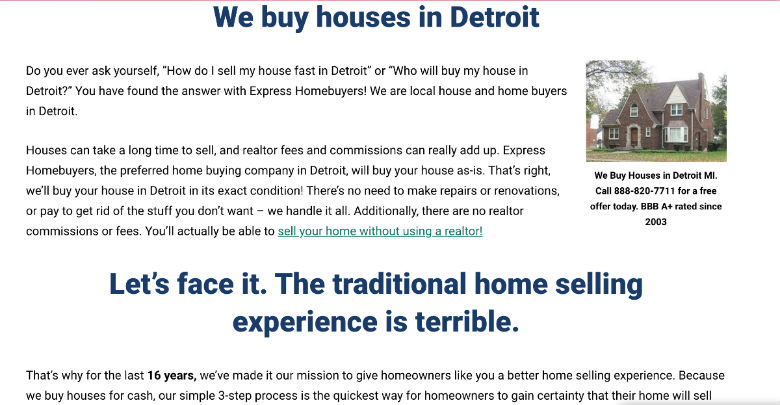
Your content should be sales focused.
The goal of your website is to sell the visitor on reaching out.
Think about what that person must know before reaching out to you. A lot of this can be found in the keyword research you’ve done. Look through the search queries and you’ll find out what questions people have.
Also take into account what questions people ask you while on call and address these on the page itself.
Many companies are afraid to give away too much information out of fear that the visitor will leave the site once satisfied but this isn’t the case.
Properly inform the prospect and you’ll be rewarded with trust, engagement, and qualified sellers calling your phone.
Recap
Okay, now that you’ve written all your content and structured your website, let’s answer these 3 questions.
- Are the main keywords in your title tags and scattered throughout each page?
- Have you built out supporting pages such as reasons why people would sell their home, process information, reviews, FAQs, blog posts, about, etc.?
- Do you have clear calls to action throughout each page to encourage the visitor to call?
- Are you linking internally between pages with keyword rich anchor text?
If you answered ‘no’ to any of these questions, make sure to circle back and make any necessary changes.
How to Optimize Off-Page SEO for Real Estate Investors
The next piece of the puzzle is to begin building off-page authority for your brand.
Ultimately, you want Google to see your website as the “go to place” for everything regarding selling a home in your particular region.
When Google sees you as the “authority” in the home buying industry, they are more likely to rank you high in their results.
Google determines authority both from your on-page as well as off-page optimizations.
The more ‘popular’ your site is around the web, the more likely it is that you are an authority in your industry.
For this reason, links back to your website play an important role in ranking.
Even today, links still are the #1 off-page ranking factor.
So the question then is, how do you get high quality links to your site?
The answer to this question is long so deserves a post of its own. That’s why we’ve gone deep into detail about the process of building links to your real estate investment website here.
SEO for Real Estate Investors: Make Your Brand Visible Online
SEO campaigns are an exceptional way to increase traffic and fuel growth of your real estate investment business. A Strategic campaign can ensure your brand is the first thing local homeowners see when they are looking to sell their property.
An effective real estate investor SEO campaign takes deep industry knowledge and patience in order to perfect but the end result is worth it. Get House Deals has been building successful real estate investment SEO campaigns for the past 5 years.
Contact us today to get a Free Audit and Strategy Session. We’ll provide you with a complete game-plan to ensure you’re the #1 investor in your local area.
